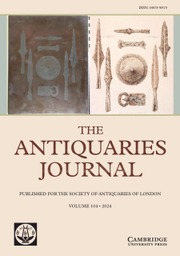No CrossRef data available.
Article contents
Far Eastern Archaeology
Published online by Cambridge University Press: 08 January 2012
Extract
English folk are apt to think that other nations have greater advantages than they in such matters as the exploration and study of foreign archaeological or historical sites, and feel resentful at times that the British Government exhibits an apathy that is little less than deplorable. Our American friends would appear to possess unlimited resources, not only now, but for many years past, that have enabled them to pursue their researches in Egypt, Greece, and Assyria, while Carnegie endowments have dispatched another group to dig even in Balkh, a city for many years forbidden to Englishmen. The French explore, and take to Paris, the treasures of Persepolis, find the money to establish institutes or other centres of French influence and culture, in Rome, Madrid, and elsewhere. Their school of living oriental languages in Paris had been in existence for many long years before England thought fit to do anything to encourage the study of Eastern tongues in this country. England seems to be incapable of supporting a journal of Oriental art such as has flourished for years past in Berlin, though in part maintained by English scholars. Meanwhile, we in England do our individual best to supplement these deficiencies, though it is seldom that an effort is made to understand the reasons that underlie and explain these marked differences between the English standpoint and that of other countries. Defective and incomplete methods of education are without doubt responsible in a great degree. Nearly every member of this audience must have had the experience, in speaking in ordinary society of some discussion that has taken place at one of our meetings, of seeing the look of blank and complete ignorance that comes over the countenance of his neighbour at the mention of almost any archaeological situation or problem. Such knowledge is relegated by the ordinary citizen to a realm peopled by such special subjects as the higher mathematics or the latest discoveries in bacteriology or chemistry. He feels not the least shame in confessing profound ignorance of the past history of his own country, and frankly regards any one possessing such knowledge as being given over to odd and queer pursuits, a kind of alchemist. It may be that the rising generation will be better equipped, as some slight return for the countless millions that are to be spent on the training of its mind. It will no doubt be urged, in certain quarters, that there is ‘no money’ in knowledge of the kind, which may seem superficially true. But even on this point there is something to be said on the other side. My friend Mr. Gordon Selfridge has for years past been providing his “staff” with lectures upon all kinds of subjects, mostly quite unrelated to the demands of his business. His reason is that he believes that the additional knowledge of any kind that his employees may possess is likely to make them more effective in their special functions. If so enterprising and competent a modern man of business takes this view, and is willing to spend money in putting it into practice, it would surely not be amiss to extend its operation into the world at large, and for the same reason. Both in theory and from personal experience, I am strongly in favour of a broad and solid foundation of general knowledge as the best initial training for specialist pursuits.
- Type
- Research Article
- Information
- Copyright
- Copyright © The Society of Antiquaries of London 1922
References
page 188 note 1 Hirth, , China and the Roman Orient, 1885.Google Scholar
page 192 note 1 It is a question, and an important one, as to how far the Indian climate will be suitable for many of these very delicate antiquities. The opinion of some competent authorities is that much will deteriorate and become useless.




